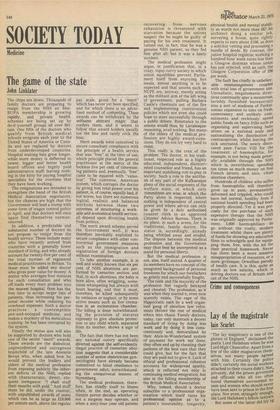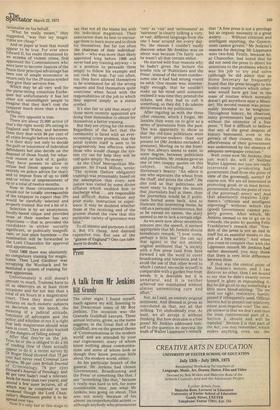Crime and consequences
Lay of the magistrate
lain Scarlet
"The lay magistracy is one of the glories of England," declaimed the poetic Lord Hailsham when he was Lord High Chancellor, Apart from a few of the older magistrates themselves, not many people agreed with him. Certainly the police didn't; certainly the social workers attached to their courts didn't. Nor, privately, did the prison governors and officials who all too often found themselves surrounded by men and women who should never have been sent to prison in the first place. Nor even, strangely enough, did Lord Hailsham's fellow lawyers.
But some of the latter did try tg' rationalise on his behalf.
"What he really meant," they suggested, "was that lay magistrates are cheap." And on paper at least that would appear to be true. For ever since Edward II, his realm threatened by an eczema of violent crime, first appointed the Commissioners who were later to become Justices of the Peace their principal advantage has been one of simple economics: in return only for the JP status symbol they give their services free.
Which may be all very well for the purse-string conscious Exchequer but unfortunately it has led other not unintelligent people to Imagine that they don't cost the taxpayer much more than a brass farthing.
The very opposite is true.
There are about 21,000 active (if that's the right word) JPs sitting in England and Wales, and between them they deal with 98, per cent of all crime brought before the courts. It is their duty not only to decide the guilt or innocence of individual defendants but also decide on the disposal of those found, for whatever reason or lack of it, guilty. They have powers to allow or refuse bail (most appear to rely entirely on police advice for that); and to impose fines of up to E400 and/or terms of imprisonment of Up to a total of twelve months.
Now in these circumstances it would not be totally unreasonable of the taxpayer to expect that JPs would be carefully selected and Properly trained. But not a bit of it.
Selection is by an anonymous, locally-based clique and provided none of their number has any objections — that is, provided the candidate is either socially significant, or politically insignifi cant, or just plain harmless — the nomination will be forwarded to the Lord Chancellor for approval and appointment.
Until 1966 there was absolutely no compulsory training for magistrates. Then Lord Gardiner was occupying the Woolsack and he Instituted a system of training for • new appointees.
Unfortunately it still doesn't amount to much. Trainees have to Sit as observers on at least three occasions and for not less than a total of six hours in a magistrates court. Then they must attend lectures on such esoteric subjects as decorum on the bench, the meaning of a judicial attitude, functions of advocates and the Police, and whether or not it is right that lady magistrates should wear hats in court. They are also warned of the dangers of falling asleep! After that they're on the job. True, he or she is obliged to do a bit of reading (few of them actually
appear to do it: a recent survey by Dr Roger Hood showed that 75 per
cent had never read Criminal Law
Review, 89 per cent British Journal of Criminology, 76 per cent Howard's Journal of Penology, and 80 per cent hadn't read a relevant book for more than two years), and
attend a few more lectures, all of Which may be completed in one weekend though the Lord Chancellor's department prefer it to be Spread over two. Now it's only fair at this stage to say that not all the blame lies with the individual magistrate. Their association does its best to encourage them to learn more and to think for themselves. But far too often the chairman of their individual bench — who was more than likely appointed long before 1966 and never had any training anyway — is in a position to persuade them simply to follow his example and not rock the boat. Far too often, too, they have allowed themselves to be nominated for all the wrong reasons and find themselves quite overcome when faced with the responsibilities of the job to which they aspired simply as a status symbol. It's also fair to add that many of those more recently appointed are doing their damnedest to obtain for themselves a better training.
But they are crying for the moon. Regardless of the fact that the community is faced with an ever increasing crime problem, that the penal system itself is seen to be progressively less effective, when those who would change the system cry out for help they will be told quite simply: No money.
As the Chief Metropolitan Magistrate, Sir Frank Milton, wrote: "The system (before obligatory training) was presumably based on the assumption that every new justice was visited by some divine afflatus which enabled him to discharge what ... are responsible and difficult duties without any prior study, instruction or experience. It may be doubted whether those at the receiving end of the process shared the view that this particular variety of ignorance was bliss."
To all intents and purposes it still is. But it's cheap. And damned expensive too. But one of the "glories of England"? One can take leave to doubt it.



































 Previous page
Previous page